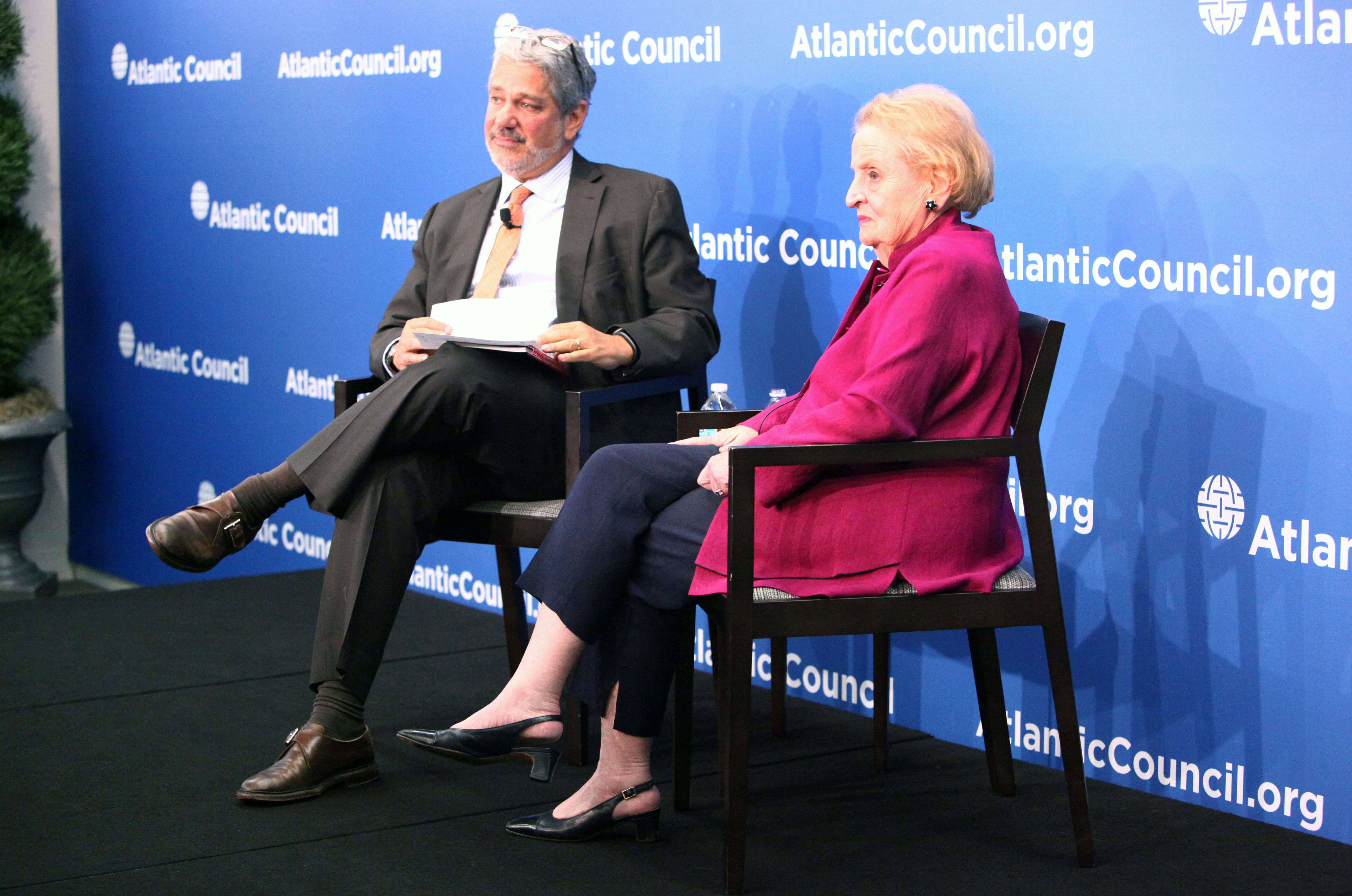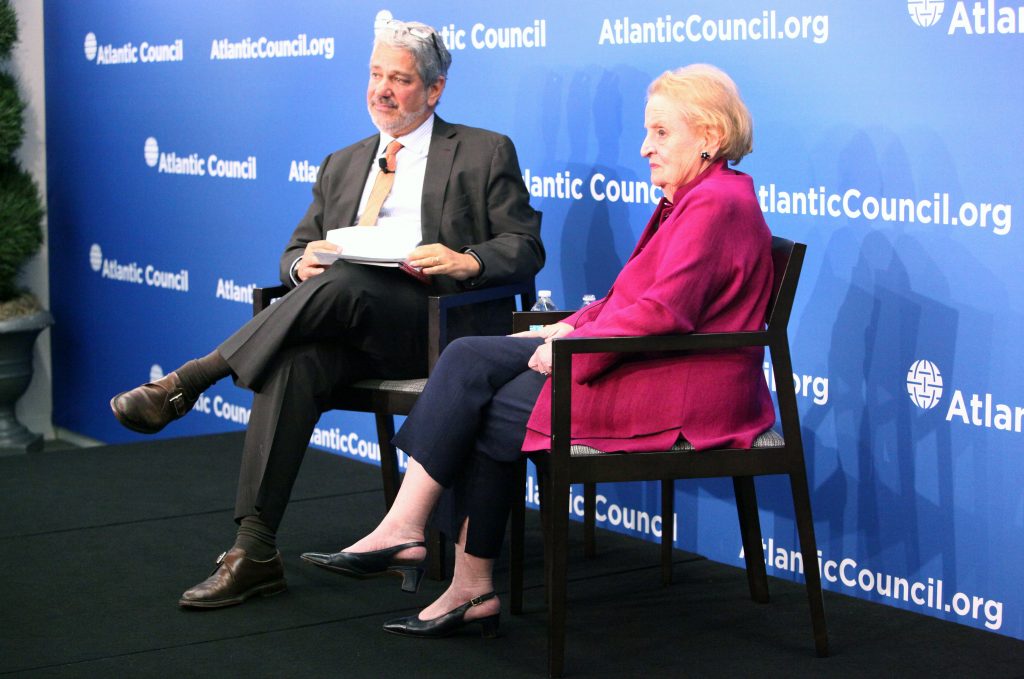 Though the digital era presents an opportunity to revolutionize the electoral process, it also brings with it an array of challenges for traditional democracy, discussed on an Oct. 9 Atlantic Council conference on the future role of technology in elections.
Though the digital era presents an opportunity to revolutionize the electoral process, it also brings with it an array of challenges for traditional democracy, discussed on an Oct. 9 Atlantic Council conference on the future role of technology in elections.
“As technology spreads to various aspects of our lives, the role it plays in elections has increasingly come under scrutiny,” said Atlantic Council Chairman Jon M. Huntsman, Jr. in opening remarks at the event “Democracy Rebooted: The Future of Technology in Elections.”
“With upcoming elections in the United States and in many countries around the world in 2016, it’s critical that we review the policies influencing elections and the technology being used to execute them,” he added.
India and Brazil are now largely conducting their elections electronically, and Estonia has set an example for the rest of the world by becoming the first country to conduct its public elections online. Meanwhile, Maryland is set to reintroduce paper ballets for next year’s elections. So how does the United States, the world’s largest democracy, follow suit?
For former Secretary of State and National Democratic Institute Chairwoman Madeleine Albright, new technology provides a clear opportunity for social and political reform—if used correctly.
Albright noted new election technology could help citizens communicate more directly and more often with their governments, connect activists in different areas, and improve the degree of transparency in the election process.
“My hope is that these new technologies will help open up elections, reduce the basis for conflict, and increase public confidence in the electoral process,” Albright said, “but that outcome is by no means inevitable, and that’s why discussions such as these are so important.”
Going forward, Albright asked subsequent speakers to consider that credible, widely accessible elections can serve as powerful catalysts to reduce corruption, empower women, and reduce civil strife, while boosting trust in the democratic process. Transparency, she said, is what matters most—democratic rules and procedure can always be improved to increase trust in government.
Albright challenged the United States to investigate how technology could improve transparency— specifically noting that past lack of clarity in elections has damaged public trust in the electoral process.
“Episodes like Bush versus Gore are why I have long believed in welcoming election monitors into our country,” Albright said, adding, “I hope we can learn from what others do best in terms of election technology and vice-versa.”
Noting society is in uncharted waters, Albright embraced a new era of testing, adjusting, and discovery of new technology to remedy the distrust similar to what the world went through with the rise of radio and television—though, she urged, while not leaving behind human values.
“What matters most … is our basic commitment to democratic values, our respect for one another, and our commitment to justice and the dignity of every human being,” Albright said, “Without those principles in front of us, we will lose our way, but with them beside us, we absolutely cannot go wrong.”
A global perspective on elections
One of the biggest issues raised when it comes to incorporating electronics into elections is credibility. Can voters come to trust an electronic democratic process in a world where news of hacks and cyberwarfare permeates headlines almost constantly? A panel moderated by International Foundation for Electoral Systems CEO Bill Sweeney sought to answer that question with electronic election success stories from around the world.
On the panel was the US Election Assistance Commission’s Matt Masterson; United Nations Department of Political Affairs Deputy Director Tadjoudine Ali-Diabacte; former Indian Minister of Information, Manish Tewari; and Brazilian Supreme Electoral Court President Justice Jose Antonio Dias Toffoli.
“The issue is trust,” said Sweeney. “Will the voter, going into the polling station, think his or her voice is going to be heard at the end of that process?”
Brazil answered that question with strict national control of the electoral process, according to Dias Toffoli.
Brazil became the first country to hold its elections entirely on electronic voting systems in 2000. Elections are organized under the complete authority of the Brazil’s judicial branch. Tight government oversight of machine procurement and election procedures have led the Brazilian people to trust in their electoral process, said Dias Toffoli.
“We don’t buy in the market a solution, we buy in the market only the hardware, because all the software [is] developed by our personnel,” he said.
“Do people trust it 100 percent? The answer to that is no,” said Tewari. “There are questions which are asked all the time—especially by those who lose. But the reason its been so successful is because people trust the institution.”
Like Brazil, India doesn’t have an absentee ballot system—voting strictly occurs in-person between pre-determined hours on election day. Electronic voting machines in both countries leave potential wrongdoers too little time to make a noticeable dent on election results.
“Between 8 o’clock in the morning and 5 o’clock in the evening, can you gerrymander enough machines to make an impact on the result? The answer to that has been in the negative,” Tewari said.
A more robust democracy
Politico reporter Nancy Scola moderated a panel that debated the possible application of new technology to encourage a more robust democracy. On stage was FP Group CEO and Editor-in-Chief David Rothkopf, National Democratic Institute Senior Associate and Director of Electoral Programs Pat Merloe, and former United Nations Deputy Secretary General Lord Mark Malloch-Brown.
Debate centered on whether the anonymity and decentralization provided by modern technology is compatible with traditional democratic values. “Technology can only go as far and as fast as people trust it,” noted Malloch-Brown.
The question of whether the ease and convenience of online voting risks replacing well-thought out decisions with impulsiveness—effectively reducing a serious election to an Internet poll—was also raised.
Regardless, when Scola asked the audience whether they would participate in an online election, an overwhelming majority raised their hand.
“Data is the fundamental economic unit of our society going forward,” said Rothkopf, adding there are still several issues to sort out and further debate is needed on the Internet’s role in democracy in an increasingly interconnected era.
Alejandro Alvarez is an intern at the Atlantic Council.
Image: "Episodes like Bush versus Gore are why I have long believed in welcoming election monitors into our country,” former Secretary of State Madeleine Albright said at the Atlantic Council on Oct. 9. Peter Schechter, Director of the Atlantic Council's Adrienne Arsht Latin America Center, moderated a discussion with Albright. (Atlantic Council/Victoria Langton)
